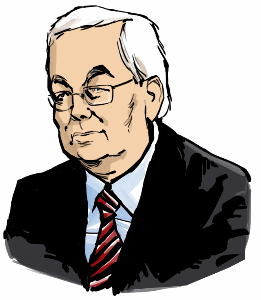Introduction
Joseph Cambell
The figure of the tyrant-monster is known to the mythologies, folk traditions, legends, and even nightmares, of the world; and his characteristics are everywhere essentially the same. He is the hoarder of the general benefit. He is the monster avid for the greedy rights of “my and mine.” The havoc wrought by him is described in mythology and fairy tales as being universal throughout his domain. This may be no more than his household, his own tortured psyche, or the lives he blights with the touch of his civilization. The inflated ego of the tyrant is a curse to himself and his world – no matter how his affairs may seem to prosper. Self-terrorized, fear-haunted, alert at every hand to meet and battle back the anticipated aggressions of his environment, which are primarily reflections of the uncontrollable impulses to acquisition within himself, the giant of self-achieved independence is the world’s messenger of disaster, even though, in his mind, he may entertain himself with humane intentions. Wherever he sets his hand there is a cry (if not from the housetops, then – more miserably – within every heart): a cry for the redeeming hero, the carrier of the shining blade, whose blow, whose touch, whose existence, will liberate the land.
Here one can neither stand nor lie nor sit
There is not even silence in the mountains
But dry sterile thunder without rain
There is not even solitude in the mountains
But red sullen faces sneer and snarl
From doors of mudcracked houses. (T.S. Eliot, The Waste Land)
The hero is the man of self-achieved submission. But submission to what? That precisely is the riddle that today we have to ask ourselves and that it is everywhere the primary virtue and historic deed of the hero to have solved. As Professor Arnold J. Toynbee indicates in his six-volume study of the laws of the rise and disintegration of civilizations, schism in the soul, schism in the body social, will not be resolved by any scheme of return to the good old days (archism), or by programs guaranteed to render an ideal projected future (futurism), or even by the most realistic, hardheaded work to weld together again the deteriorating elements. Only birth can conquer death – the birth, not of the old thing again, but of something new. Within the soul, within the body social, there must be – if we are to experience long survival – a continuous “recurrence of birth” (palingenesia) to nullify the unremitting recurrences of death. For it is by means of our own victories, if we are not regenerated, that the work of Nemesis is wrought: doom breaks from the shell of our very virtue. Peace then is a snare; war is a snare; change is a snare; permanence is a snare. When our day is come for the victory of death, death closes in; there is nothing we can do, except be crucified – and resurrected; dismembered totally, and then reborn. (The Hero With a Thousand Faces, Princeton University Press, Second Edition, 1968, pp. 15-17)
***
I. Hetjan Sturla Þórðarson.
(Sturlu þáttr, 2. k.)
12008 = Gaf konungi eigi at sigla þann dag.
23333 = En um kveldit, áðr hann fór at sofa, lét hann kalla á Sturlu.
18842 = Ok er hann kom, kvaddi hann konung ok mælti síðan:
10731 = “Hvat vilið þér mér, herra?”
16594 = Konungr bað taka silfrker, fullt af víni,
19928 = ok drakk af nökkut, fekk síðan Sturlu ok mælti:
10799 = “Vín skal til vinar drekka.”
6861 = Sturla mælti:
9229 = “Guð sé lofaðr, at svá sé.”
5911 = “Svá skal vera,”
7037 = segir konungr.
14107 = “En nú vil ek, at þú kveðir kvæðit,
16532 = þat sem þú hefir ort um föður minn.”
10130 = Sturla kvað þá kvæðit.
23344 = En er lokit var, lofuðu menn mjök ok mest dróttning.
7037 = Konungr mælti:
15851 = “Þat ætla ek, at þú kveðir betr en páfinn.”
228274
II. The Mousetrap – Light slays Tyrant-Monster
Some must watch while some must sleep
(Hamlet, (Act III, Sc. Ii – First Folio,1623)
Ophelia:
6561 = The King rises.
Hamlet:
14245 = What, frighted with false fire.
Queene:
8414 = How fares my Lord?
Polonius:
6848 = Giue o’re the Play.
King:
10045 = Giue me some Light. Away.
All:
14262 = Lights, Lights, Lights. Exeunt.
8919 = Manet Hamlet & Horatio.
Hamlet:
17145 = Why let the strucken Deere go weepe,
8782 = The Hart vngalled play:
22955 = For some must watch, while some must sleepe;
13692 = So runnes the world away.
131868
III. Malachy’s Last-Pope Prophecy
(From Internet)
13831 = In persecutione extrema S.R.E.
12051 = sedebit Petrus Romanus,
22136 = qui pascet oues in multis tribulationibus:
26227 = quibus transactis ciuitas septicollis diruetur,
22573 = & Iudex tremêdus iudicabit populum suum. Finis.
96818
In extreme persecution, the seat of the Holy Roman Church will be occupied by Peter the Roman, who will feed the sheep through many tribulations; when they are over, the city of seven hills will be destroyed, and the terrible or fearsome Judge will judge his people. The End.
IV. Tyrant’s Death – Monad’s Resurrection
(Platonic-Pythagorean symbolism)
-729 = Death (-) of Platonic Tyrant (729)
1 = Monad
216 = Resurrection – Triangle 3-4-5 raised to third power, 27+64+125=216.
100 = The End
-412
So runnes the world away
II + III + IV = 131868 + 96818 – 412 = 228274.
***
Reiknivél sem umbreytir stöfum í tölugildi er á netinu:
http://www.light-of-truth.com/ciphersaga.htm

 Gunnar Tómasson
Gunnar Tómasson